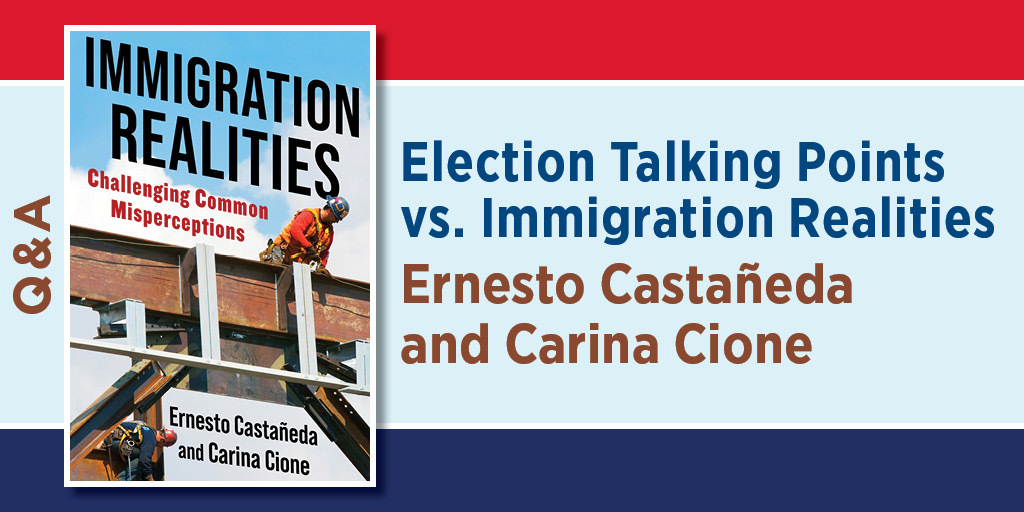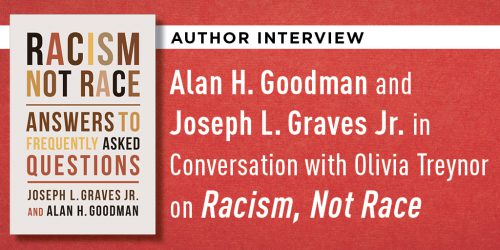Election Talking Points vs. Immigration Realities
Ernesto Castañeda and Carina Cione

In Immigration Realities: Challenging Common Misperceptions, Ernesto Castañeda and Carina Cione present evidence about the causes and effects of international migration. Each chapter debunks a frequently encountered claim and answers common questions from fresh perspectives with data and analyses from numerous disciplines and sources. The authors also provide context and information to understand debates around immigration taking place around the 2024 U.S. election. In this Q&A, they answer questions often posed by journalists and voters.
Q: As Joe Biden’s vice president, Kamala Harris is, in essence, running as an incumbent. So she inherited his weaknesses, and one of the most evident is migration policy. How can Republicans exploit this and to what extent can this hurt her campaign?
Ernesto Castañeda and Carina Cione: Kamala Harris is indeed practically running as an incumbent. This is good for her because, everything else equal, incumbents tend to win re-election. Harris can run on the record of the Biden-Harris administration, which put the country and the economy back to normal after the pandemic disruptions (an incredibly difficult feat that was improbable but now is taken as a given) and enacted popular and ambitious bipartisan deals such as the Infrastructure Investment and Jobs Act of 2021 and the Inflation Reduction Act of 2022.
Republicans continue to attack Democrats on immigration numbers and border security, much as they have for decades. The number of encounters at the border was not necessarily lower during the Trump administration before pandemic measures were put into place. Contrary to common perception, the border wall was largely built by presidents preceding Trump. However, both parties supported similar policies before Trump made immigration his main issue. Joe Biden’s 2020 campaign successfully framed cruel anti-immigrant words and policies as Republican issues that he did not support.
There was an increase in asylum applications after the border stopped being closed because of the pandemic. However, following Biden’s June 4, 2024, executive order on asylum-seeking, encounters at the border of people without papers or appointments are the lowest since September 2020.
The Biden-Harris administration has implemented innovative immigration programs to make immigration more orderly and humane, given the lack of congressional support and budget to improve the system.
Republican attacks on Harris around immigration policy will not be effective because they are already baked into voter preferences. Supporters and opponents are already very familiar with Trump’s anti-immigration stance. Those supporting Democrats because of their concerns over reproductive health, government abortion bans, or threats to democracy won’t vote for Trump because of immigration statistics and news stories.
Q: How has the Democratic Party changed its approach towards migration in the past decades, especially during the Biden administration?
Castañeda and Cione: Among many new policies, the Biden administration ended Trump’s “Muslim ban,” gave immigration papers to people from Afghanistan who had helped the U.S. military, welcomed Ukrainians, and released an app (CBPOne) for migrants to set appointments to apply for asylum from Mexico. The Biden White House also started a program for people from Venezuela, Cuba, Nicaragua, and Haiti to relocate to the United States with permission if they were sponsored by a family member or contact inside the country. It continued Temporary Protective Status for people from Central America and Haiti. In June, the administration announced a program to create a path to citizenship for undocumented people married to U.S. citizens or who had graduated from college.
These policies were not unpopular with the general electorate. Indeed, we would argue that, besides journalists on the immigration/border security beat and immigration-restrictionist organizations, most of these executive orders and administrative programs have gone under the radar of the public. Nonetheless, they helped create a slightly more orderly and humane immigration process, especially without comprehensive immigration reform from Congress.
Q: Polling (The Economist/YouGov, June 9–11, 2024) suggests that 14 percent of registered voters view immigration as the most important issue facing the country, second only to inflation. Can you explain how migration became such a big electoral issue?
Castañeda and Cione: While some anti-immigrant groups and campaigns spend a lot of money complaining about immigration, most citizens do not see immigration as something bad, per se; 14 percent is a numerical minority, and immigration restriction is an increasingly partisan issue. Republican voters are more concerned about this topic than Democrats or independents. Interestingly, people living further away from the border and in places with a lower percentage of immigrants are more worried about border security than people living in border states, on the coasts, or in cities with relatively large immigrant populations.
When people answer that they are concerned about “immigration,” they may also be expressing concern about keeping families together in the United States, providing rights to long-term residents who do not have immigration papers, protecting asylum, etc.
So, while public opinion by a loud minority is important to take into account, most people are favorable or indifferent about immigration. Furthermore, as our book shows, immigrants commit less crime than the U.S.-born; are a boon to the national economy, federal coffers, and the places where they live; and integrate and learn English over time. The U.S. Southwest is safe, and anti-immigrant policies and border walls do not work to deter immigration.
Q: Migration is a polarizing issue today. Historically, however, the United States has always been open to foreigners and relies on immigrant labor. Even without granting citizenship, different ethnic groups were once tolerated and integrated into society. In your view, what factors have contributed to the change in this perception? What are the roots of this shift?
Castañeda and Cione: Immigration has long increased the population, economic, and cultural outputs of the United States. Immigrants integrate over time and become Americans regardless of their origin. However, it has often been the case that contemporaries complain about newcomers changing the nature of the place. Benjamin Franklin complained that German-speaking immigrants were unassimilable. The “Know Nothing” Party (1844–1860) complained about Catholics and Southern Europeans being a cultural threat to the country; after a fast increase in popularity, the party disappeared after a few years on the national scene. So, what we see today is not new. The United States of America has not only survived previous immigration but has become so special because of it.
There have often been concerted efforts to scapegoat immigrants for things that are independent of immigration, such as neoliberal policies that led to offshoring and deindustrialization, increasing economic inequality, fiscal deficits, decreases in public spending on basic and college education, etc. Immigrants do not take jobs away from others; on the contrary, they create new jobs by starting new businesses, facilitating innovation, and increasing consumer demand for goods and services. Immigrants pay taxes and contribute to Social Security and Medicare, even if they are undocumented.
Q: Migrant encounters at the southern border increased during part of the Biden administration. What are the possible ways to deal with this without harming rights to asylum and violating humanitarian norms? And won’t the United States need migrants as the working-age population dwindles?
Castañeda and Cione: The way people arriving at the border were processed and counted has varied much throughout history. There were major changes during and since the pandemic, with large increases in double-counting during the implementation of the U.S. Code’s Title 42 to limit asylum because of public health concerns. In 2023, people presenting themselves to authorities and asking for asylum probably surpassed the number of people trying to pass undetected. Contrary to truly undocumented immigrants, unaccompanied minors, paroled people, refugees, and asylum seekers are all coming in following existing laws and government programs and can be easily counted and tracked. Many are also deported later on. Those who are allowed to stay permanently or while awaiting their immigration court date often get documents from the U.S. government, acquire working permits relatively quickly, pay taxes, and work in the formal economy. Asylum is an important safeguard for people escaping persecution from states or organized crime, and it allows countries receiving them to do so in a legal and orderly fashion if they implement efficient procedures and the needed administrative infrastructure.
Indeed, in recent years, the U.S. population, the workforce, and the economy have been able to grow thanks to immigration.








